50 countries to meet in Milan ahead of COP26

There has been a great deal of communication confusion about the two international climate events that will precede COP26. Milan, Italy, will host both the “Youth4climate” initiative – with almost 400 young climate activists from all over the world as protagonists – and, subsequently, from Thursday 30 September to Saturday 2 October, the official preCOP26.
Giulia Persico wrote these days about what the Youth4climate initiative, conceived and launched by the Italian government in partnership with the British one, will be and how it will work. The proposals of the 400 young activists will therefore be brought to the attention of the Ministers of countries involved in the pre-COP on 30 September, to stimulate even more debate and aim for ever greater ambition in policies.
PreCOP26, on the other hand, is a multilateral ministerial-level table under the aegis of the UNFCCC, the UN climate convention. It is not at all an initiative of the Italian government, nor of the Italy-UK partnership that manages the COP26 path. The preCOPs have always been held about a month before the actual COP and see the participation of a representative group of countries, usually 40, this year enlarged to 50. In the choice of countries by the organizers (UNFCCC Secretariat, host countries), geographical balance is everything. The 50 delegations will thus represent the negotiating groups existing in the world of the United Nations (developing countries, so-called third world networks, fragile island states and many others).
Compared to the latest preCOPs (Krakow 2018, Costa Rica 2019), that of Milan will have even more the arduous task of pushing the agenda of the work on the thorniest issues that remained on stand-by for a year and a half as far forward as possible. In particular, the delegates of the 50 countries will discuss how to proceed in the practical definition of key instruments envisaged by the 2015 Paris Agreement: carbon markets pursuant to Article 6 of the Agreement and consequent implementation of the Katowice Rulebook, transparency and reporting (on this in Katowice in 2018 it was decided what to do, but there is still no substantiated as in common tables and methods in view of the date of entry into force of these measures, 2023), adaptation, loss and damage, in addition to the thorniest issue and transversal of all, that of climate finance, which to date has struggled to take off. Last but not least, there will certainly be a debate on what emerged from the latest IPCC publication on 9 August, as well as on the new UNFCCC summary report on the ambition of national contributions (NDCs), scheduled for release on the next 28 September.
Let us specify that this type of negotiation (preCOPs) does not produce any formal document, nor any final declaration. Simply, since this is a preparatory meeting for the actual negotiation; working documents will come out of the preCOP for the heads of the various working groups, containing general indications on the margins for manoeuvre and compromise on each specific issue once in plenary a Glasgow.
The announced presence at the opening of the preCOP of the President of the Republic Sergio Mattarella, of the Premier Mario Draghi, of the British Prime Minister Boris Johnson and of the Foreign Minister Luigi Di Maio will certainly bring attention to the resumption of negotiations and from these leaders we can legitimately expect a call for a greater global climate ambition, also in light of the most recent Italian and British positions on the issue, not least that of Premier Draghi on 17 September 2021 at the Forum of the Major Economies on Energy and Climate (Mef), promoted by US President Joe Biden. Finally, Biden announced a few days ago, during the work of the United Nations General Assembly, a new US contribution towards the goal of 100 billion a year in climate finance for countries most in need. Political positions which, we recall, can have an impact on the leadership of individual countries in defining the guidelines which are then entrusted to the technicians involved in the various negotiations.
What about civil society? The preCOP, as mentioned, is a small ministerial working table, not a COP. For this reason, only representatives of the various UNFCCC constituencies (young people, research centres, think tanks, companies) were invited as observers, unlike real climate conferences where numerous organizations such as Italian Climate Network can participate. The possibility of an active participation of civil society in the negotiations seems, therefore, to be a more inherent issue in the COP in Glasgow than in the Milan table, in a year that will most likely see an almost absence of activism and voluntary organizations from the Global South, blocked by slow vaccination campaigns and prices still inaccessible for the return air travel.
Italian Climate Network will monitor the work of the preCOP as much as possible in view of COP26 thanks, as always, to an incredible group of young volunteers and experts from all over Italy. All updates will be published in our COP Bulletin.
You are reading this ICN COP Bulletin article is part of the EC DEAR SPARK project. ICN monitors negotiations and reports what is happening in Italian and English, on our website and on social channels, as part of a pan-European consortium of over 20 non-profit organizations committed to promoting climate awareness with particular attention to the role of young people and issues related to international cooperation and gender policies.


